Empirical Investigation: Leadership in UK Hospitality Sector
VerifiedAdded on 2019/12/17
|81
|21517
|210
Thesis and Dissertation
AI Summary
This dissertation investigates the impact of leadership on organizational performance within the UK hospitality sector, with a specific focus on Hilton Hotel and Resorts. The study explores the significance of leadership, defining its role and impact on employee motivation and overall business outcomes. The research examines various leadership strategies and their effects on organizational performance, considering the evolving market trends and customer expectations. The methodology includes a literature review, research methodology, data analysis, and a conclusion with recommendations for enhancing leadership practices within the hospitality industry. The research aims to identify effective leadership approaches that can improve the performance of hospitality establishments in the UK, addressing the challenges of a competitive global market and the need for strategic management of employees.
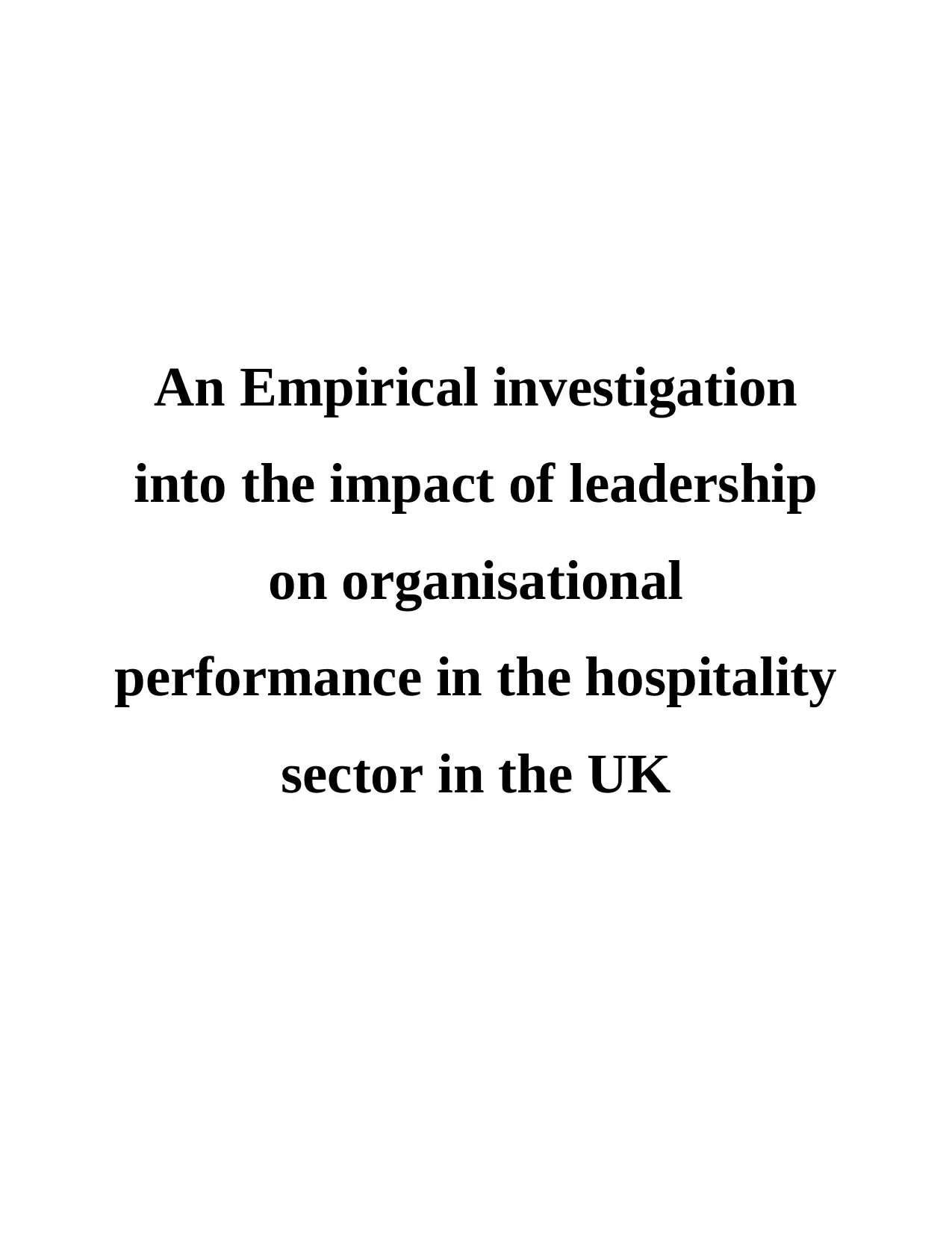
An Empirical investigation
into the impact of leadership
on organisational
performance in the hospitality
sector in the UK
into the impact of leadership
on organisational
performance in the hospitality
sector in the UK
Paraphrase This Document
Need a fresh take? Get an instant paraphrase of this document with our AI Paraphraser
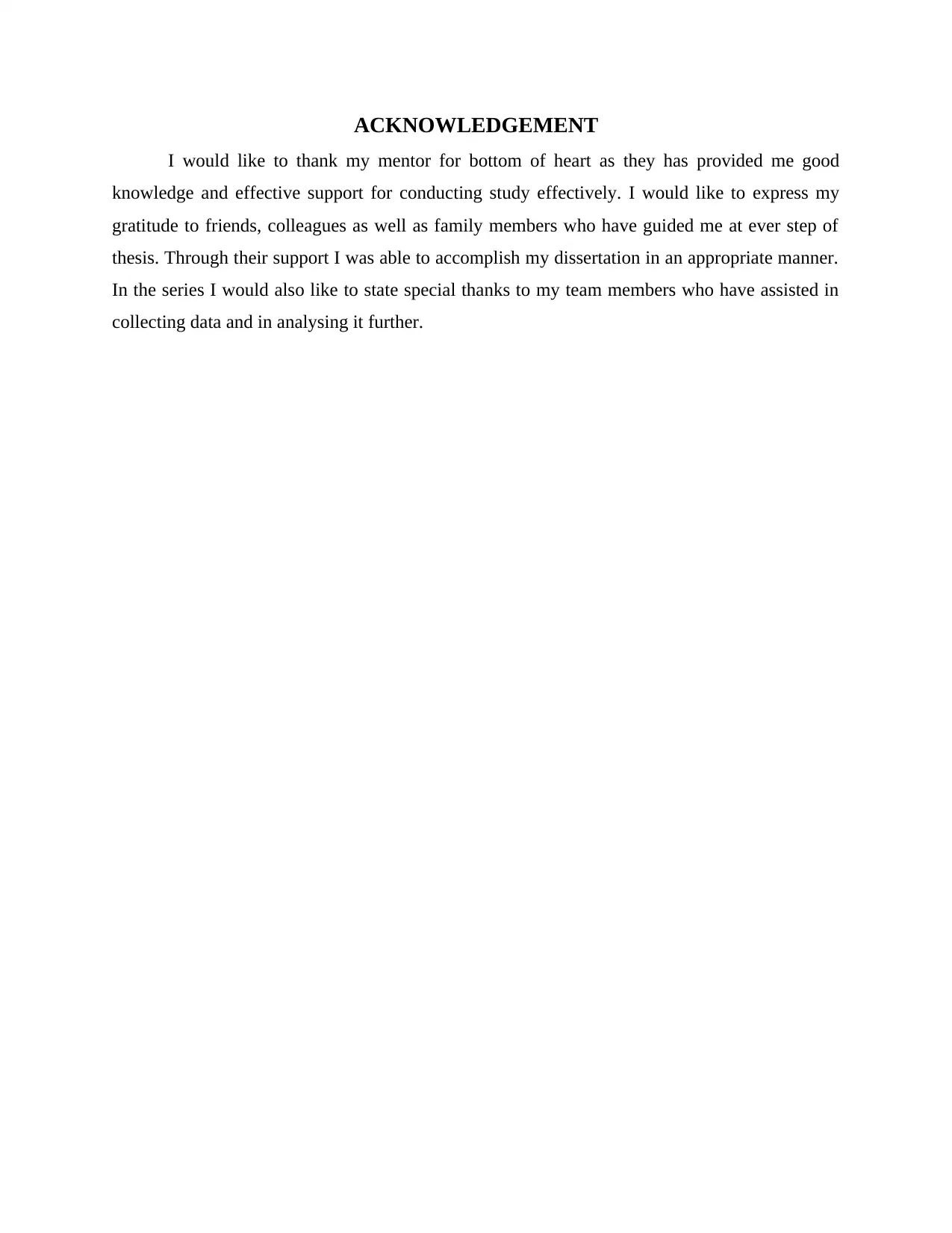
ACKNOWLEDGEMENT
I would like to thank my mentor for bottom of heart as they has provided me good
knowledge and effective support for conducting study effectively. I would like to express my
gratitude to friends, colleagues as well as family members who have guided me at ever step of
thesis. Through their support I was able to accomplish my dissertation in an appropriate manner.
In the series I would also like to state special thanks to my team members who have assisted in
collecting data and in analysing it further.
I would like to thank my mentor for bottom of heart as they has provided me good
knowledge and effective support for conducting study effectively. I would like to express my
gratitude to friends, colleagues as well as family members who have guided me at ever step of
thesis. Through their support I was able to accomplish my dissertation in an appropriate manner.
In the series I would also like to state special thanks to my team members who have assisted in
collecting data and in analysing it further.
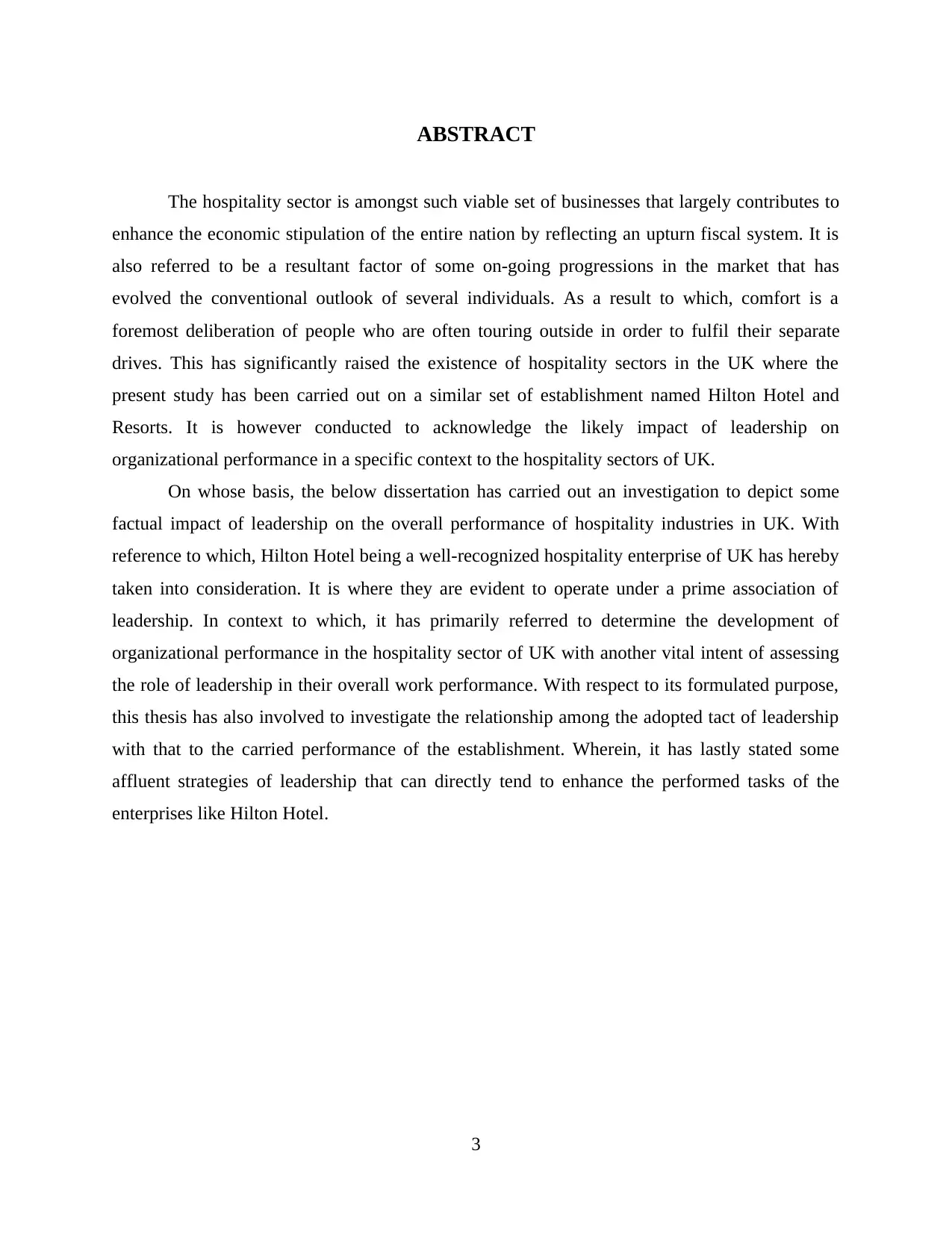
ABSTRACT
The hospitality sector is amongst such viable set of businesses that largely contributes to
enhance the economic stipulation of the entire nation by reflecting an upturn fiscal system. It is
also referred to be a resultant factor of some on-going progressions in the market that has
evolved the conventional outlook of several individuals. As a result to which, comfort is a
foremost deliberation of people who are often touring outside in order to fulfil their separate
drives. This has significantly raised the existence of hospitality sectors in the UK where the
present study has been carried out on a similar set of establishment named Hilton Hotel and
Resorts. It is however conducted to acknowledge the likely impact of leadership on
organizational performance in a specific context to the hospitality sectors of UK.
On whose basis, the below dissertation has carried out an investigation to depict some
factual impact of leadership on the overall performance of hospitality industries in UK. With
reference to which, Hilton Hotel being a well-recognized hospitality enterprise of UK has hereby
taken into consideration. It is where they are evident to operate under a prime association of
leadership. In context to which, it has primarily referred to determine the development of
organizational performance in the hospitality sector of UK with another vital intent of assessing
the role of leadership in their overall work performance. With respect to its formulated purpose,
this thesis has also involved to investigate the relationship among the adopted tact of leadership
with that to the carried performance of the establishment. Wherein, it has lastly stated some
affluent strategies of leadership that can directly tend to enhance the performed tasks of the
enterprises like Hilton Hotel.
3
The hospitality sector is amongst such viable set of businesses that largely contributes to
enhance the economic stipulation of the entire nation by reflecting an upturn fiscal system. It is
also referred to be a resultant factor of some on-going progressions in the market that has
evolved the conventional outlook of several individuals. As a result to which, comfort is a
foremost deliberation of people who are often touring outside in order to fulfil their separate
drives. This has significantly raised the existence of hospitality sectors in the UK where the
present study has been carried out on a similar set of establishment named Hilton Hotel and
Resorts. It is however conducted to acknowledge the likely impact of leadership on
organizational performance in a specific context to the hospitality sectors of UK.
On whose basis, the below dissertation has carried out an investigation to depict some
factual impact of leadership on the overall performance of hospitality industries in UK. With
reference to which, Hilton Hotel being a well-recognized hospitality enterprise of UK has hereby
taken into consideration. It is where they are evident to operate under a prime association of
leadership. In context to which, it has primarily referred to determine the development of
organizational performance in the hospitality sector of UK with another vital intent of assessing
the role of leadership in their overall work performance. With respect to its formulated purpose,
this thesis has also involved to investigate the relationship among the adopted tact of leadership
with that to the carried performance of the establishment. Wherein, it has lastly stated some
affluent strategies of leadership that can directly tend to enhance the performed tasks of the
enterprises like Hilton Hotel.
3
⊘ This is a preview!⊘
Do you want full access?
Subscribe today to unlock all pages.

Trusted by 1+ million students worldwide
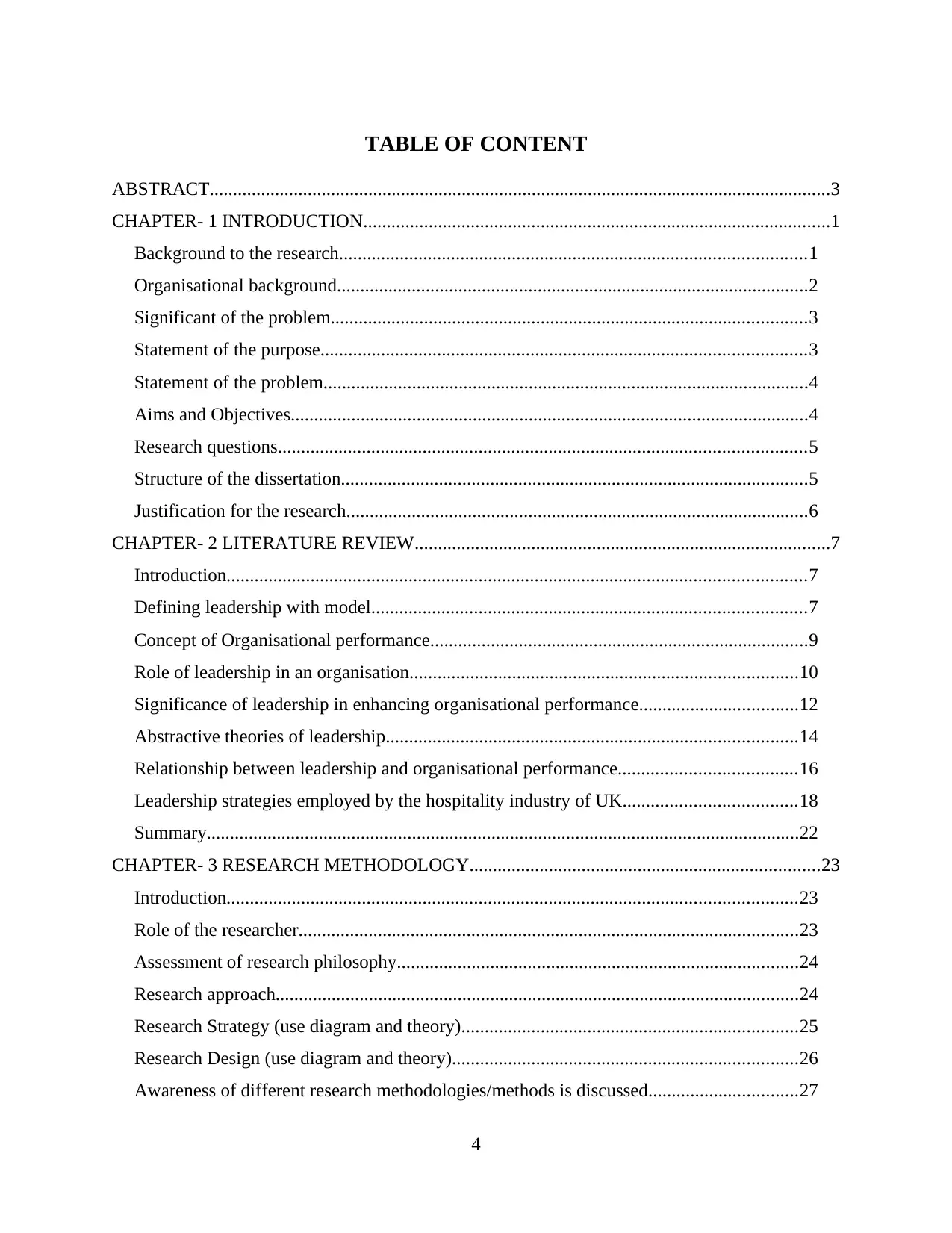
TABLE OF CONTENT
ABSTRACT.....................................................................................................................................3
CHAPTER- 1 INTRODUCTION....................................................................................................1
Background to the research....................................................................................................1
Organisational background.....................................................................................................2
Significant of the problem......................................................................................................3
Statement of the purpose........................................................................................................3
Statement of the problem........................................................................................................4
Aims and Objectives...............................................................................................................4
Research questions.................................................................................................................5
Structure of the dissertation....................................................................................................5
Justification for the research...................................................................................................6
CHAPTER- 2 LITERATURE REVIEW.........................................................................................7
Introduction............................................................................................................................7
Defining leadership with model.............................................................................................7
Concept of Organisational performance.................................................................................9
Role of leadership in an organisation...................................................................................10
Significance of leadership in enhancing organisational performance..................................12
Abstractive theories of leadership........................................................................................14
Relationship between leadership and organisational performance......................................16
Leadership strategies employed by the hospitality industry of UK.....................................18
Summary...............................................................................................................................22
CHAPTER- 3 RESEARCH METHODOLOGY...........................................................................23
Introduction..........................................................................................................................23
Role of the researcher...........................................................................................................23
Assessment of research philosophy......................................................................................24
Research approach................................................................................................................24
Research Strategy (use diagram and theory)........................................................................25
Research Design (use diagram and theory)..........................................................................26
Awareness of different research methodologies/methods is discussed................................27
4
ABSTRACT.....................................................................................................................................3
CHAPTER- 1 INTRODUCTION....................................................................................................1
Background to the research....................................................................................................1
Organisational background.....................................................................................................2
Significant of the problem......................................................................................................3
Statement of the purpose........................................................................................................3
Statement of the problem........................................................................................................4
Aims and Objectives...............................................................................................................4
Research questions.................................................................................................................5
Structure of the dissertation....................................................................................................5
Justification for the research...................................................................................................6
CHAPTER- 2 LITERATURE REVIEW.........................................................................................7
Introduction............................................................................................................................7
Defining leadership with model.............................................................................................7
Concept of Organisational performance.................................................................................9
Role of leadership in an organisation...................................................................................10
Significance of leadership in enhancing organisational performance..................................12
Abstractive theories of leadership........................................................................................14
Relationship between leadership and organisational performance......................................16
Leadership strategies employed by the hospitality industry of UK.....................................18
Summary...............................................................................................................................22
CHAPTER- 3 RESEARCH METHODOLOGY...........................................................................23
Introduction..........................................................................................................................23
Role of the researcher...........................................................................................................23
Assessment of research philosophy......................................................................................24
Research approach................................................................................................................24
Research Strategy (use diagram and theory)........................................................................25
Research Design (use diagram and theory)..........................................................................26
Awareness of different research methodologies/methods is discussed................................27
4
Paraphrase This Document
Need a fresh take? Get an instant paraphrase of this document with our AI Paraphraser
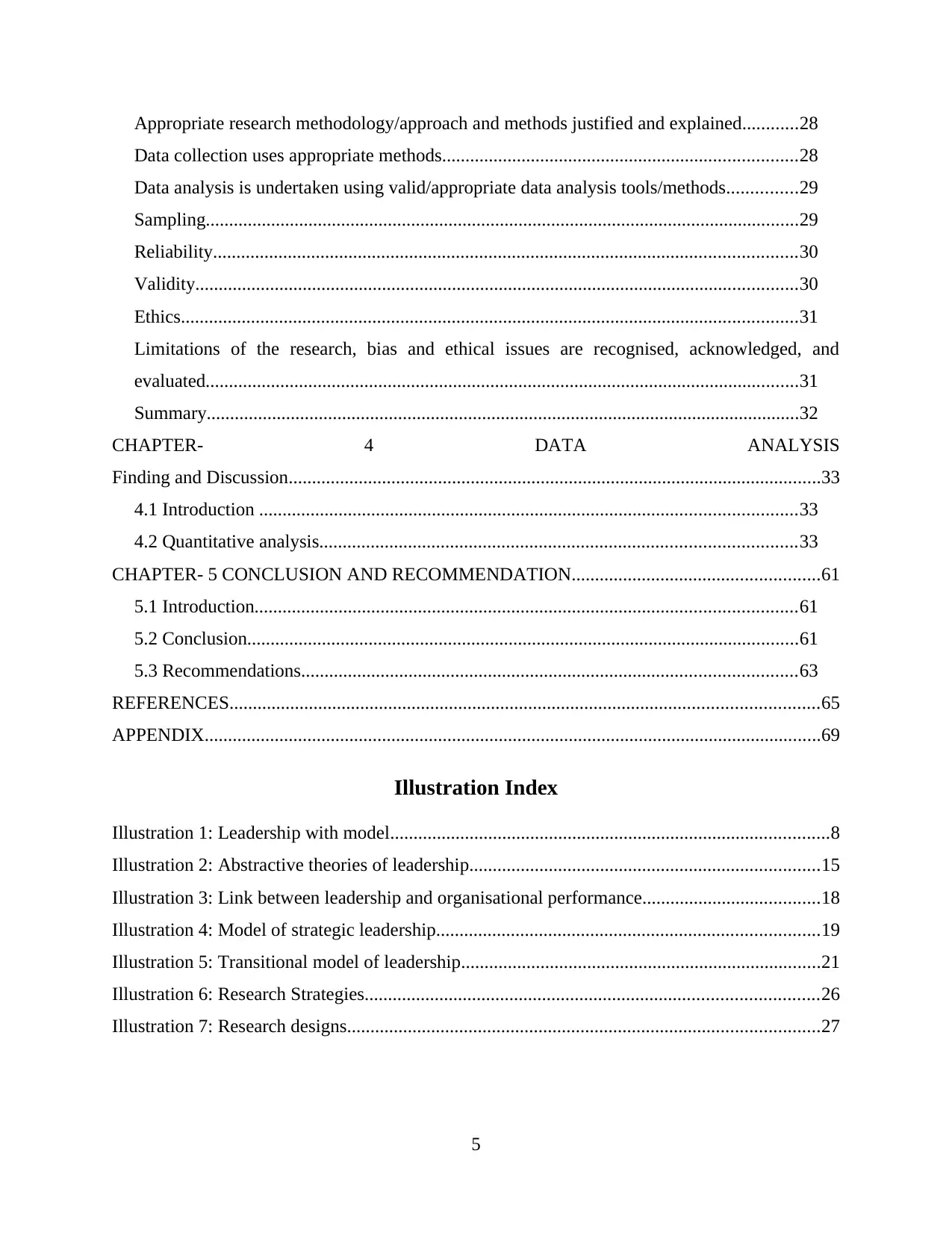
Appropriate research methodology/approach and methods justified and explained............28
Data collection uses appropriate methods............................................................................28
Data analysis is undertaken using valid/appropriate data analysis tools/methods...............29
Sampling...............................................................................................................................29
Reliability.............................................................................................................................30
Validity.................................................................................................................................30
Ethics....................................................................................................................................31
Limitations of the research, bias and ethical issues are recognised, acknowledged, and
evaluated...............................................................................................................................31
Summary...............................................................................................................................32
CHAPTER- 4 DATA ANALYSIS
Finding and Discussion..................................................................................................................33
4.1 Introduction ...................................................................................................................33
4.2 Quantitative analysis......................................................................................................33
CHAPTER- 5 CONCLUSION AND RECOMMENDATION.....................................................61
5.1 Introduction....................................................................................................................61
5.2 Conclusion......................................................................................................................61
5.3 Recommendations..........................................................................................................63
REFERENCES..............................................................................................................................65
APPENDIX....................................................................................................................................69
Illustration Index
Illustration 1: Leadership with model..............................................................................................8
Illustration 2: Abstractive theories of leadership...........................................................................15
Illustration 3: Link between leadership and organisational performance......................................18
Illustration 4: Model of strategic leadership..................................................................................19
Illustration 5: Transitional model of leadership.............................................................................21
Illustration 6: Research Strategies.................................................................................................26
Illustration 7: Research designs.....................................................................................................27
5
Data collection uses appropriate methods............................................................................28
Data analysis is undertaken using valid/appropriate data analysis tools/methods...............29
Sampling...............................................................................................................................29
Reliability.............................................................................................................................30
Validity.................................................................................................................................30
Ethics....................................................................................................................................31
Limitations of the research, bias and ethical issues are recognised, acknowledged, and
evaluated...............................................................................................................................31
Summary...............................................................................................................................32
CHAPTER- 4 DATA ANALYSIS
Finding and Discussion..................................................................................................................33
4.1 Introduction ...................................................................................................................33
4.2 Quantitative analysis......................................................................................................33
CHAPTER- 5 CONCLUSION AND RECOMMENDATION.....................................................61
5.1 Introduction....................................................................................................................61
5.2 Conclusion......................................................................................................................61
5.3 Recommendations..........................................................................................................63
REFERENCES..............................................................................................................................65
APPENDIX....................................................................................................................................69
Illustration Index
Illustration 1: Leadership with model..............................................................................................8
Illustration 2: Abstractive theories of leadership...........................................................................15
Illustration 3: Link between leadership and organisational performance......................................18
Illustration 4: Model of strategic leadership..................................................................................19
Illustration 5: Transitional model of leadership.............................................................................21
Illustration 6: Research Strategies.................................................................................................26
Illustration 7: Research designs.....................................................................................................27
5
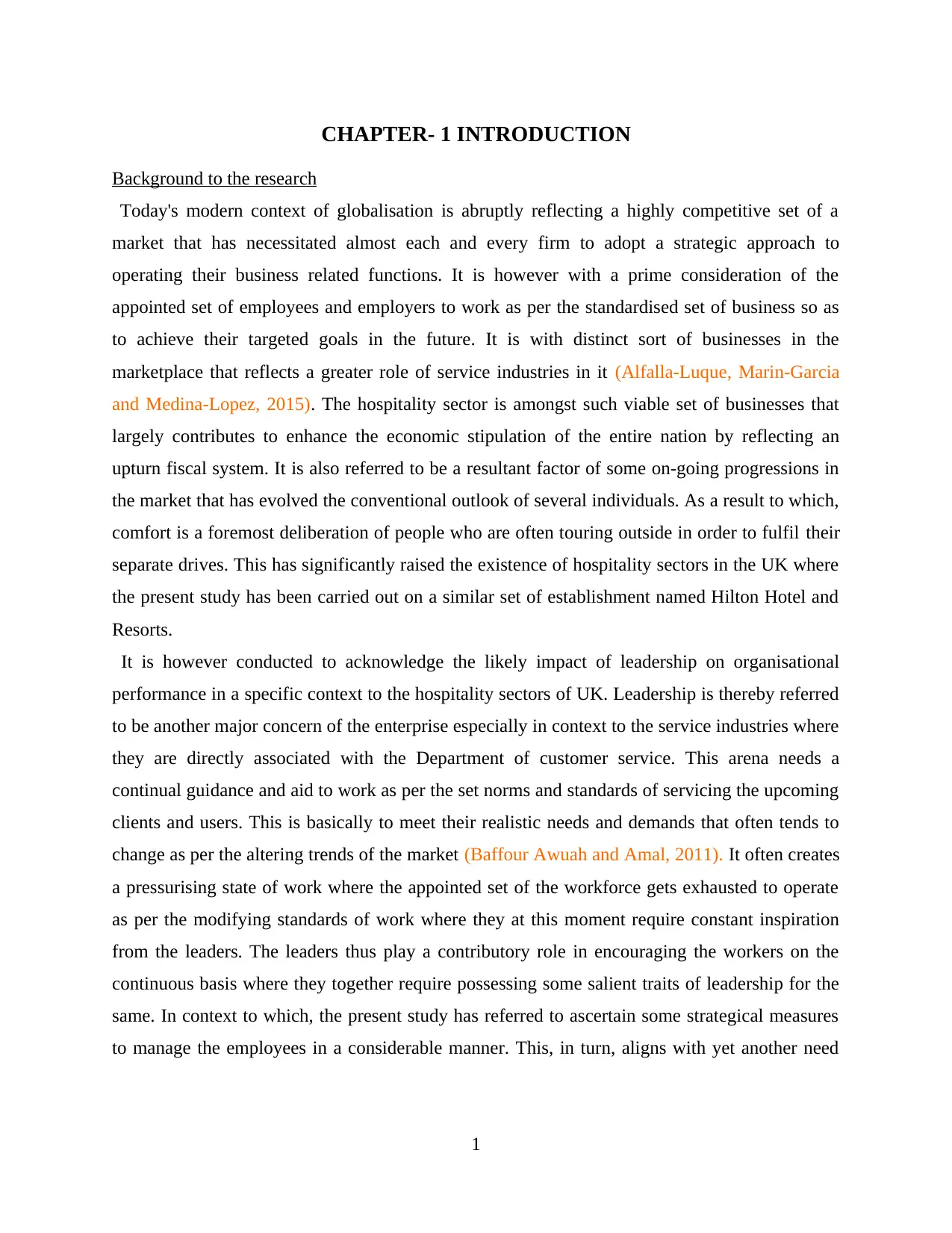
CHAPTER- 1 INTRODUCTION
Background to the research
Today's modern context of globalisation is abruptly reflecting a highly competitive set of a
market that has necessitated almost each and every firm to adopt a strategic approach to
operating their business related functions. It is however with a prime consideration of the
appointed set of employees and employers to work as per the standardised set of business so as
to achieve their targeted goals in the future. It is with distinct sort of businesses in the
marketplace that reflects a greater role of service industries in it (Alfalla-Luque, Marin-Garcia
and Medina-Lopez, 2015). The hospitality sector is amongst such viable set of businesses that
largely contributes to enhance the economic stipulation of the entire nation by reflecting an
upturn fiscal system. It is also referred to be a resultant factor of some on-going progressions in
the market that has evolved the conventional outlook of several individuals. As a result to which,
comfort is a foremost deliberation of people who are often touring outside in order to fulfil their
separate drives. This has significantly raised the existence of hospitality sectors in the UK where
the present study has been carried out on a similar set of establishment named Hilton Hotel and
Resorts.
It is however conducted to acknowledge the likely impact of leadership on organisational
performance in a specific context to the hospitality sectors of UK. Leadership is thereby referred
to be another major concern of the enterprise especially in context to the service industries where
they are directly associated with the Department of customer service. This arena needs a
continual guidance and aid to work as per the set norms and standards of servicing the upcoming
clients and users. This is basically to meet their realistic needs and demands that often tends to
change as per the altering trends of the market (Baffour Awuah and Amal, 2011). It often creates
a pressurising state of work where the appointed set of the workforce gets exhausted to operate
as per the modifying standards of work where they at this moment require constant inspiration
from the leaders. The leaders thus play a contributory role in encouraging the workers on the
continuous basis where they together require possessing some salient traits of leadership for the
same. In context to which, the present study has referred to ascertain some strategical measures
to manage the employees in a considerable manner. This, in turn, aligns with yet another need
1
Background to the research
Today's modern context of globalisation is abruptly reflecting a highly competitive set of a
market that has necessitated almost each and every firm to adopt a strategic approach to
operating their business related functions. It is however with a prime consideration of the
appointed set of employees and employers to work as per the standardised set of business so as
to achieve their targeted goals in the future. It is with distinct sort of businesses in the
marketplace that reflects a greater role of service industries in it (Alfalla-Luque, Marin-Garcia
and Medina-Lopez, 2015). The hospitality sector is amongst such viable set of businesses that
largely contributes to enhance the economic stipulation of the entire nation by reflecting an
upturn fiscal system. It is also referred to be a resultant factor of some on-going progressions in
the market that has evolved the conventional outlook of several individuals. As a result to which,
comfort is a foremost deliberation of people who are often touring outside in order to fulfil their
separate drives. This has significantly raised the existence of hospitality sectors in the UK where
the present study has been carried out on a similar set of establishment named Hilton Hotel and
Resorts.
It is however conducted to acknowledge the likely impact of leadership on organisational
performance in a specific context to the hospitality sectors of UK. Leadership is thereby referred
to be another major concern of the enterprise especially in context to the service industries where
they are directly associated with the Department of customer service. This arena needs a
continual guidance and aid to work as per the set norms and standards of servicing the upcoming
clients and users. This is basically to meet their realistic needs and demands that often tends to
change as per the altering trends of the market (Baffour Awuah and Amal, 2011). It often creates
a pressurising state of work where the appointed set of the workforce gets exhausted to operate
as per the modifying standards of work where they at this moment require constant inspiration
from the leaders. The leaders thus play a contributory role in encouraging the workers on the
continuous basis where they together require possessing some salient traits of leadership for the
same. In context to which, the present study has referred to ascertain some strategical measures
to manage the employees in a considerable manner. This, in turn, aligns with yet another need
1
⊘ This is a preview!⊘
Do you want full access?
Subscribe today to unlock all pages.

Trusted by 1+ million students worldwide
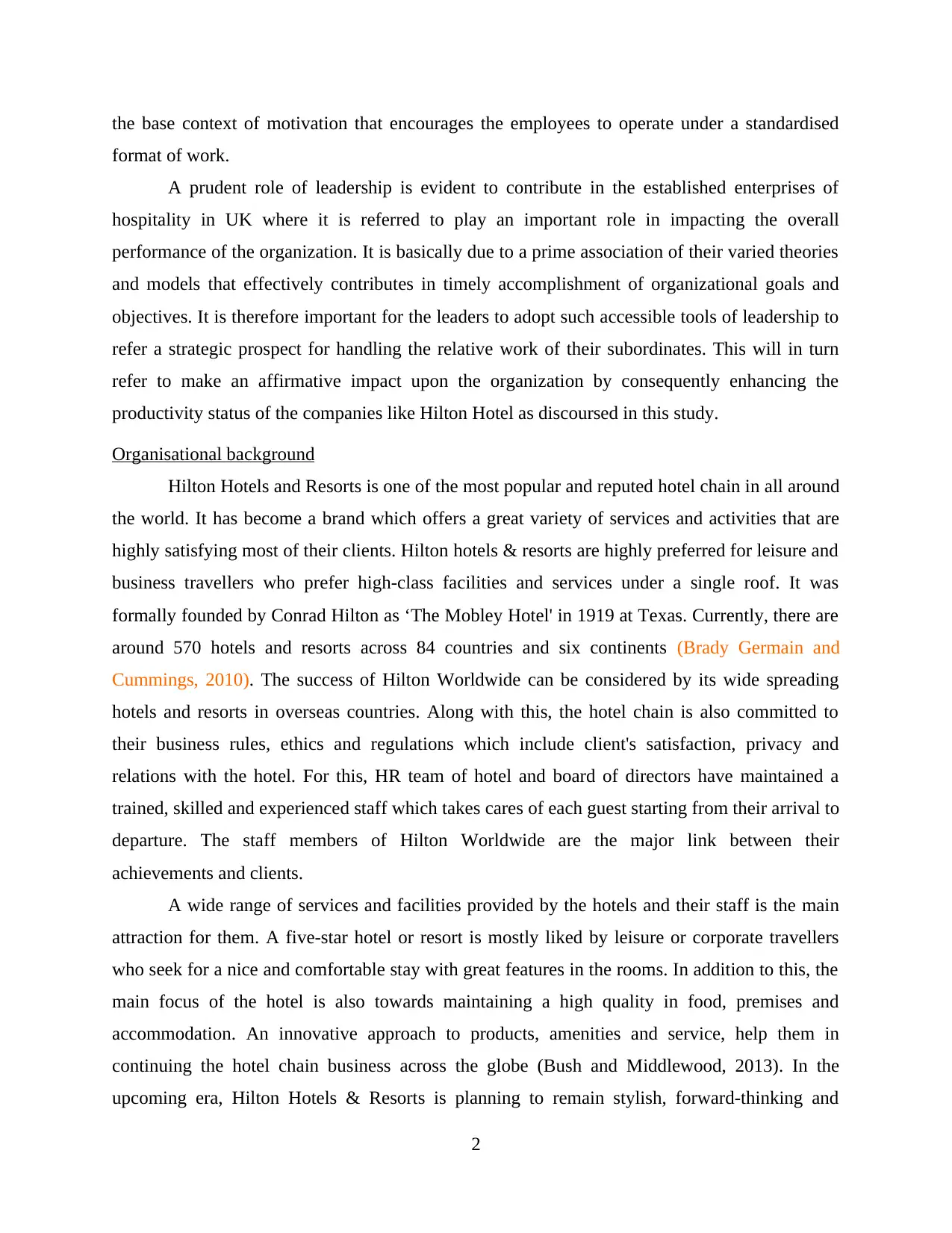
the base context of motivation that encourages the employees to operate under a standardised
format of work.
A prudent role of leadership is evident to contribute in the established enterprises of
hospitality in UK where it is referred to play an important role in impacting the overall
performance of the organization. It is basically due to a prime association of their varied theories
and models that effectively contributes in timely accomplishment of organizational goals and
objectives. It is therefore important for the leaders to adopt such accessible tools of leadership to
refer a strategic prospect for handling the relative work of their subordinates. This will in turn
refer to make an affirmative impact upon the organization by consequently enhancing the
productivity status of the companies like Hilton Hotel as discoursed in this study.
Organisational background
Hilton Hotels and Resorts is one of the most popular and reputed hotel chain in all around
the world. It has become a brand which offers a great variety of services and activities that are
highly satisfying most of their clients. Hilton hotels & resorts are highly preferred for leisure and
business travellers who prefer high-class facilities and services under a single roof. It was
formally founded by Conrad Hilton as ‘The Mobley Hotel' in 1919 at Texas. Currently, there are
around 570 hotels and resorts across 84 countries and six continents (Brady Germain and
Cummings, 2010). The success of Hilton Worldwide can be considered by its wide spreading
hotels and resorts in overseas countries. Along with this, the hotel chain is also committed to
their business rules, ethics and regulations which include client's satisfaction, privacy and
relations with the hotel. For this, HR team of hotel and board of directors have maintained a
trained, skilled and experienced staff which takes cares of each guest starting from their arrival to
departure. The staff members of Hilton Worldwide are the major link between their
achievements and clients.
A wide range of services and facilities provided by the hotels and their staff is the main
attraction for them. A five-star hotel or resort is mostly liked by leisure or corporate travellers
who seek for a nice and comfortable stay with great features in the rooms. In addition to this, the
main focus of the hotel is also towards maintaining a high quality in food, premises and
accommodation. An innovative approach to products, amenities and service, help them in
continuing the hotel chain business across the globe (Bush and Middlewood, 2013). In the
upcoming era, Hilton Hotels & Resorts is planning to remain stylish, forward-thinking and
2
format of work.
A prudent role of leadership is evident to contribute in the established enterprises of
hospitality in UK where it is referred to play an important role in impacting the overall
performance of the organization. It is basically due to a prime association of their varied theories
and models that effectively contributes in timely accomplishment of organizational goals and
objectives. It is therefore important for the leaders to adopt such accessible tools of leadership to
refer a strategic prospect for handling the relative work of their subordinates. This will in turn
refer to make an affirmative impact upon the organization by consequently enhancing the
productivity status of the companies like Hilton Hotel as discoursed in this study.
Organisational background
Hilton Hotels and Resorts is one of the most popular and reputed hotel chain in all around
the world. It has become a brand which offers a great variety of services and activities that are
highly satisfying most of their clients. Hilton hotels & resorts are highly preferred for leisure and
business travellers who prefer high-class facilities and services under a single roof. It was
formally founded by Conrad Hilton as ‘The Mobley Hotel' in 1919 at Texas. Currently, there are
around 570 hotels and resorts across 84 countries and six continents (Brady Germain and
Cummings, 2010). The success of Hilton Worldwide can be considered by its wide spreading
hotels and resorts in overseas countries. Along with this, the hotel chain is also committed to
their business rules, ethics and regulations which include client's satisfaction, privacy and
relations with the hotel. For this, HR team of hotel and board of directors have maintained a
trained, skilled and experienced staff which takes cares of each guest starting from their arrival to
departure. The staff members of Hilton Worldwide are the major link between their
achievements and clients.
A wide range of services and facilities provided by the hotels and their staff is the main
attraction for them. A five-star hotel or resort is mostly liked by leisure or corporate travellers
who seek for a nice and comfortable stay with great features in the rooms. In addition to this, the
main focus of the hotel is also towards maintaining a high quality in food, premises and
accommodation. An innovative approach to products, amenities and service, help them in
continuing the hotel chain business across the globe (Bush and Middlewood, 2013). In the
upcoming era, Hilton Hotels & Resorts is planning to remain stylish, forward-thinking and
2
Paraphrase This Document
Need a fresh take? Get an instant paraphrase of this document with our AI Paraphraser
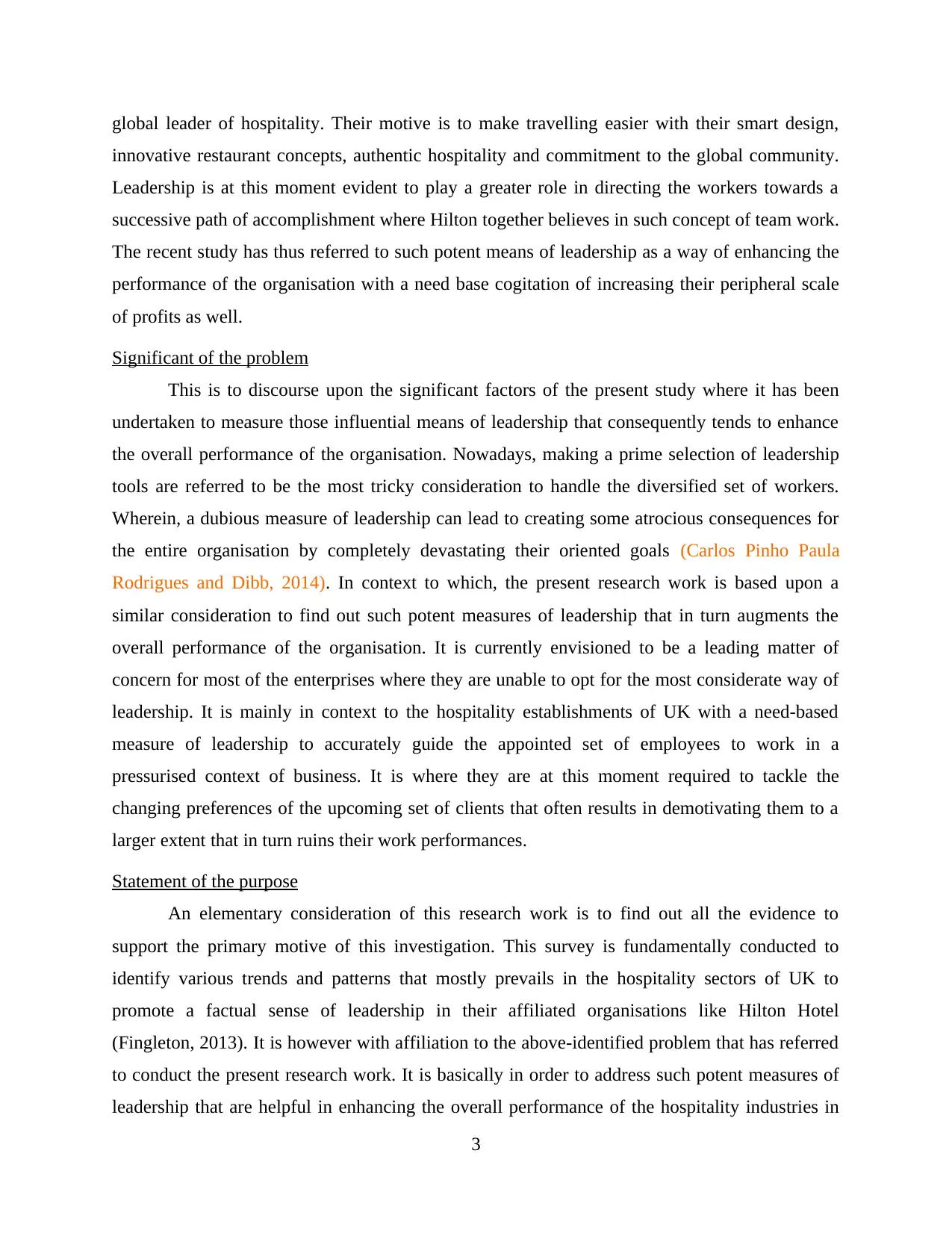
global leader of hospitality. Their motive is to make travelling easier with their smart design,
innovative restaurant concepts, authentic hospitality and commitment to the global community.
Leadership is at this moment evident to play a greater role in directing the workers towards a
successive path of accomplishment where Hilton together believes in such concept of team work.
The recent study has thus referred to such potent means of leadership as a way of enhancing the
performance of the organisation with a need base cogitation of increasing their peripheral scale
of profits as well.
Significant of the problem
This is to discourse upon the significant factors of the present study where it has been
undertaken to measure those influential means of leadership that consequently tends to enhance
the overall performance of the organisation. Nowadays, making a prime selection of leadership
tools are referred to be the most tricky consideration to handle the diversified set of workers.
Wherein, a dubious measure of leadership can lead to creating some atrocious consequences for
the entire organisation by completely devastating their oriented goals (Carlos Pinho Paula
Rodrigues and Dibb, 2014). In context to which, the present research work is based upon a
similar consideration to find out such potent measures of leadership that in turn augments the
overall performance of the organisation. It is currently envisioned to be a leading matter of
concern for most of the enterprises where they are unable to opt for the most considerate way of
leadership. It is mainly in context to the hospitality establishments of UK with a need-based
measure of leadership to accurately guide the appointed set of employees to work in a
pressurised context of business. It is where they are at this moment required to tackle the
changing preferences of the upcoming set of clients that often results in demotivating them to a
larger extent that in turn ruins their work performances.
Statement of the purpose
An elementary consideration of this research work is to find out all the evidence to
support the primary motive of this investigation. This survey is fundamentally conducted to
identify various trends and patterns that mostly prevails in the hospitality sectors of UK to
promote a factual sense of leadership in their affiliated organisations like Hilton Hotel
(Fingleton, 2013). It is however with affiliation to the above-identified problem that has referred
to conduct the present research work. It is basically in order to address such potent measures of
leadership that are helpful in enhancing the overall performance of the hospitality industries in
3
innovative restaurant concepts, authentic hospitality and commitment to the global community.
Leadership is at this moment evident to play a greater role in directing the workers towards a
successive path of accomplishment where Hilton together believes in such concept of team work.
The recent study has thus referred to such potent means of leadership as a way of enhancing the
performance of the organisation with a need base cogitation of increasing their peripheral scale
of profits as well.
Significant of the problem
This is to discourse upon the significant factors of the present study where it has been
undertaken to measure those influential means of leadership that consequently tends to enhance
the overall performance of the organisation. Nowadays, making a prime selection of leadership
tools are referred to be the most tricky consideration to handle the diversified set of workers.
Wherein, a dubious measure of leadership can lead to creating some atrocious consequences for
the entire organisation by completely devastating their oriented goals (Carlos Pinho Paula
Rodrigues and Dibb, 2014). In context to which, the present research work is based upon a
similar consideration to find out such potent measures of leadership that in turn augments the
overall performance of the organisation. It is currently envisioned to be a leading matter of
concern for most of the enterprises where they are unable to opt for the most considerate way of
leadership. It is mainly in context to the hospitality establishments of UK with a need-based
measure of leadership to accurately guide the appointed set of employees to work in a
pressurised context of business. It is where they are at this moment required to tackle the
changing preferences of the upcoming set of clients that often results in demotivating them to a
larger extent that in turn ruins their work performances.
Statement of the purpose
An elementary consideration of this research work is to find out all the evidence to
support the primary motive of this investigation. This survey is fundamentally conducted to
identify various trends and patterns that mostly prevails in the hospitality sectors of UK to
promote a factual sense of leadership in their affiliated organisations like Hilton Hotel
(Fingleton, 2013). It is however with affiliation to the above-identified problem that has referred
to conduct the present research work. It is basically in order to address such potent measures of
leadership that are helpful in enhancing the overall performance of the hospitality industries in
3
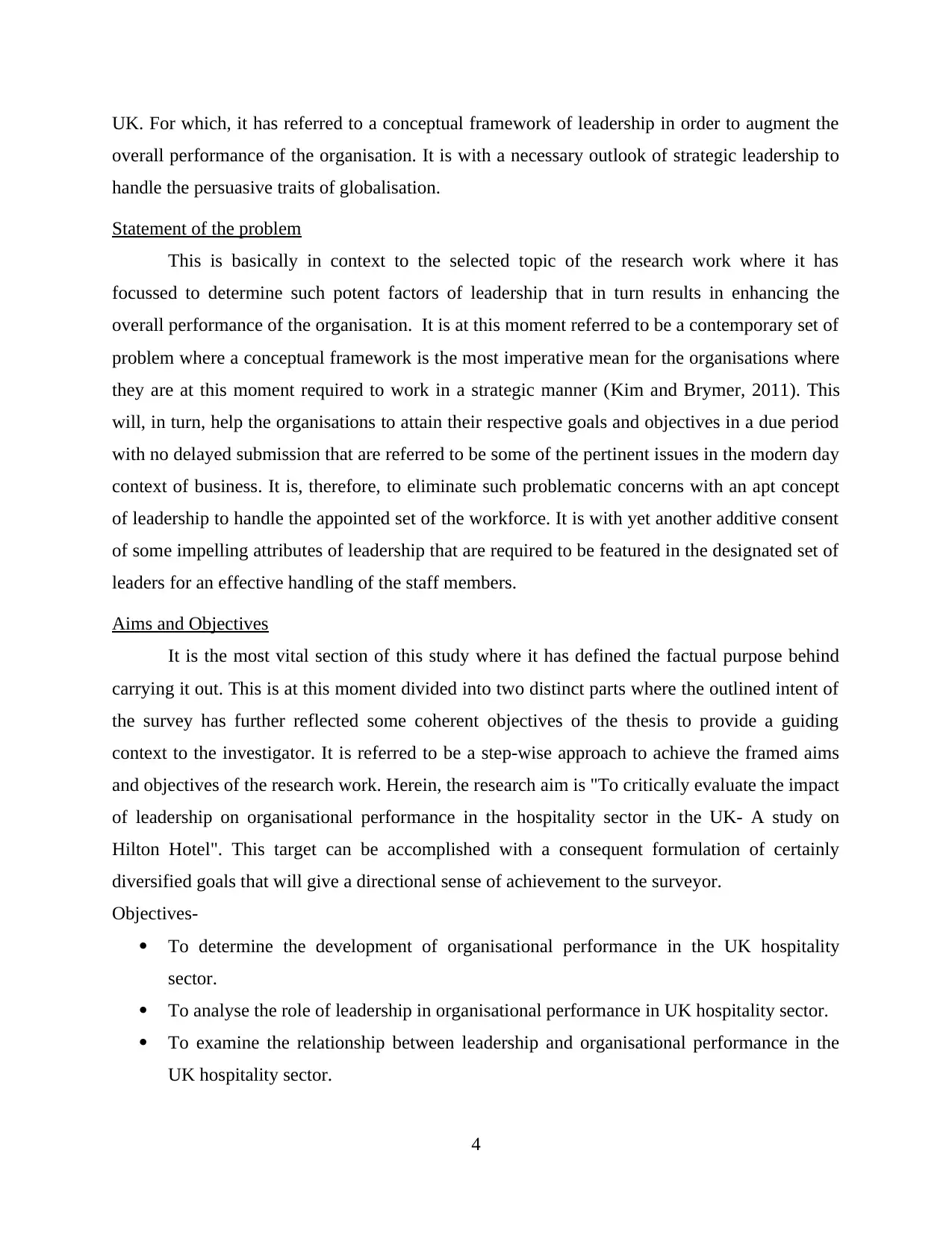
UK. For which, it has referred to a conceptual framework of leadership in order to augment the
overall performance of the organisation. It is with a necessary outlook of strategic leadership to
handle the persuasive traits of globalisation.
Statement of the problem
This is basically in context to the selected topic of the research work where it has
focussed to determine such potent factors of leadership that in turn results in enhancing the
overall performance of the organisation. It is at this moment referred to be a contemporary set of
problem where a conceptual framework is the most imperative mean for the organisations where
they are at this moment required to work in a strategic manner (Kim and Brymer, 2011). This
will, in turn, help the organisations to attain their respective goals and objectives in a due period
with no delayed submission that are referred to be some of the pertinent issues in the modern day
context of business. It is, therefore, to eliminate such problematic concerns with an apt concept
of leadership to handle the appointed set of the workforce. It is with yet another additive consent
of some impelling attributes of leadership that are required to be featured in the designated set of
leaders for an effective handling of the staff members.
Aims and Objectives
It is the most vital section of this study where it has defined the factual purpose behind
carrying it out. This is at this moment divided into two distinct parts where the outlined intent of
the survey has further reflected some coherent objectives of the thesis to provide a guiding
context to the investigator. It is referred to be a step-wise approach to achieve the framed aims
and objectives of the research work. Herein, the research aim is "To critically evaluate the impact
of leadership on organisational performance in the hospitality sector in the UK- A study on
Hilton Hotel". This target can be accomplished with a consequent formulation of certainly
diversified goals that will give a directional sense of achievement to the surveyor.
Objectives-
To determine the development of organisational performance in the UK hospitality
sector.
To analyse the role of leadership in organisational performance in UK hospitality sector.
To examine the relationship between leadership and organisational performance in the
UK hospitality sector.
4
overall performance of the organisation. It is with a necessary outlook of strategic leadership to
handle the persuasive traits of globalisation.
Statement of the problem
This is basically in context to the selected topic of the research work where it has
focussed to determine such potent factors of leadership that in turn results in enhancing the
overall performance of the organisation. It is at this moment referred to be a contemporary set of
problem where a conceptual framework is the most imperative mean for the organisations where
they are at this moment required to work in a strategic manner (Kim and Brymer, 2011). This
will, in turn, help the organisations to attain their respective goals and objectives in a due period
with no delayed submission that are referred to be some of the pertinent issues in the modern day
context of business. It is, therefore, to eliminate such problematic concerns with an apt concept
of leadership to handle the appointed set of the workforce. It is with yet another additive consent
of some impelling attributes of leadership that are required to be featured in the designated set of
leaders for an effective handling of the staff members.
Aims and Objectives
It is the most vital section of this study where it has defined the factual purpose behind
carrying it out. This is at this moment divided into two distinct parts where the outlined intent of
the survey has further reflected some coherent objectives of the thesis to provide a guiding
context to the investigator. It is referred to be a step-wise approach to achieve the framed aims
and objectives of the research work. Herein, the research aim is "To critically evaluate the impact
of leadership on organisational performance in the hospitality sector in the UK- A study on
Hilton Hotel". This target can be accomplished with a consequent formulation of certainly
diversified goals that will give a directional sense of achievement to the surveyor.
Objectives-
To determine the development of organisational performance in the UK hospitality
sector.
To analyse the role of leadership in organisational performance in UK hospitality sector.
To examine the relationship between leadership and organisational performance in the
UK hospitality sector.
4
⊘ This is a preview!⊘
Do you want full access?
Subscribe today to unlock all pages.

Trusted by 1+ million students worldwide
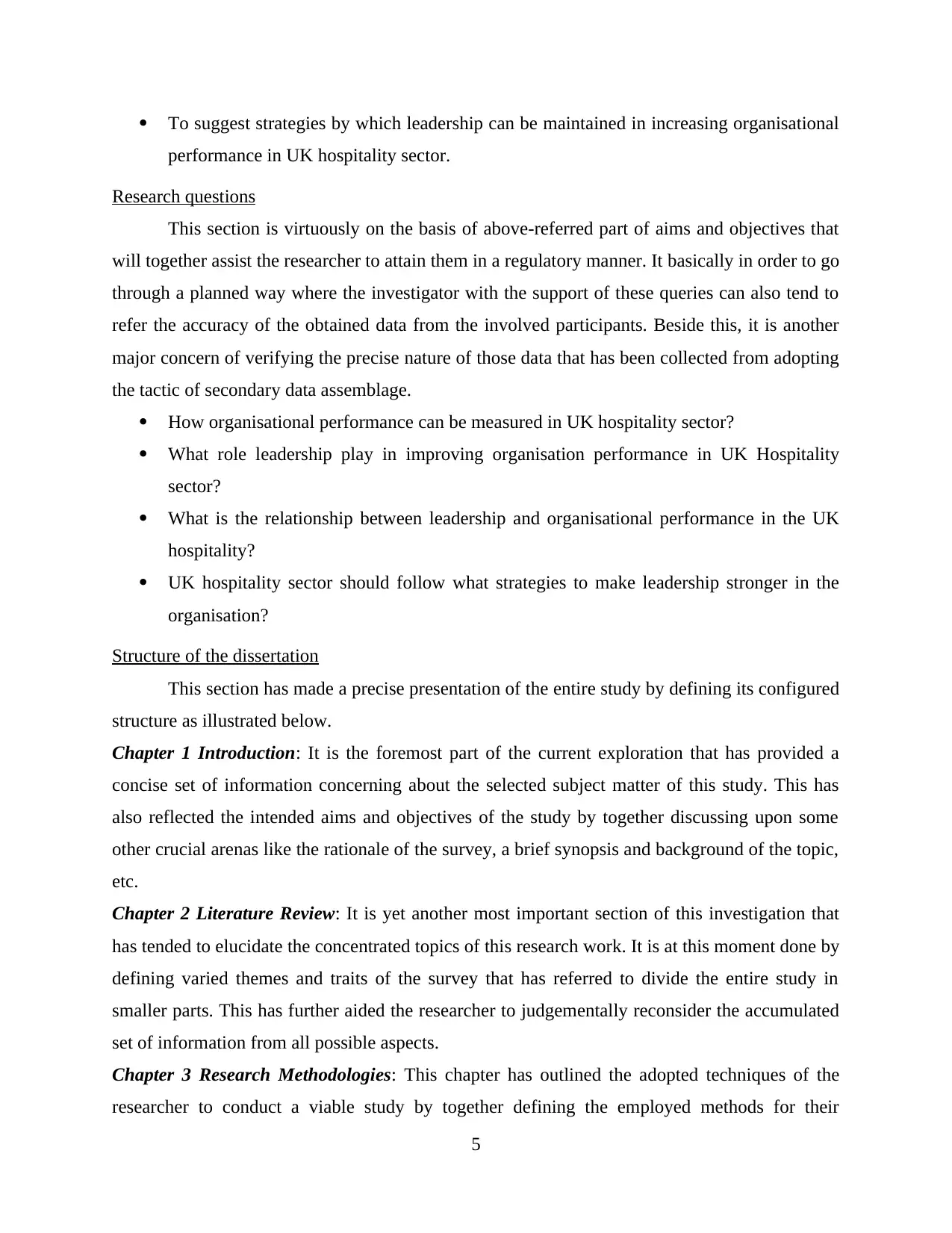
To suggest strategies by which leadership can be maintained in increasing organisational
performance in UK hospitality sector.
Research questions
This section is virtuously on the basis of above-referred part of aims and objectives that
will together assist the researcher to attain them in a regulatory manner. It basically in order to go
through a planned way where the investigator with the support of these queries can also tend to
refer the accuracy of the obtained data from the involved participants. Beside this, it is another
major concern of verifying the precise nature of those data that has been collected from adopting
the tactic of secondary data assemblage.
How organisational performance can be measured in UK hospitality sector?
What role leadership play in improving organisation performance in UK Hospitality
sector?
What is the relationship between leadership and organisational performance in the UK
hospitality?
UK hospitality sector should follow what strategies to make leadership stronger in the
organisation?
Structure of the dissertation
This section has made a precise presentation of the entire study by defining its configured
structure as illustrated below.
Chapter 1 Introduction: It is the foremost part of the current exploration that has provided a
concise set of information concerning about the selected subject matter of this study. This has
also reflected the intended aims and objectives of the study by together discussing upon some
other crucial arenas like the rationale of the survey, a brief synopsis and background of the topic,
etc.
Chapter 2 Literature Review: It is yet another most important section of this investigation that
has tended to elucidate the concentrated topics of this research work. It is at this moment done by
defining varied themes and traits of the survey that has referred to divide the entire study in
smaller parts. This has further aided the researcher to judgementally reconsider the accumulated
set of information from all possible aspects.
Chapter 3 Research Methodologies: This chapter has outlined the adopted techniques of the
researcher to conduct a viable study by together defining the employed methods for their
5
performance in UK hospitality sector.
Research questions
This section is virtuously on the basis of above-referred part of aims and objectives that
will together assist the researcher to attain them in a regulatory manner. It basically in order to go
through a planned way where the investigator with the support of these queries can also tend to
refer the accuracy of the obtained data from the involved participants. Beside this, it is another
major concern of verifying the precise nature of those data that has been collected from adopting
the tactic of secondary data assemblage.
How organisational performance can be measured in UK hospitality sector?
What role leadership play in improving organisation performance in UK Hospitality
sector?
What is the relationship between leadership and organisational performance in the UK
hospitality?
UK hospitality sector should follow what strategies to make leadership stronger in the
organisation?
Structure of the dissertation
This section has made a precise presentation of the entire study by defining its configured
structure as illustrated below.
Chapter 1 Introduction: It is the foremost part of the current exploration that has provided a
concise set of information concerning about the selected subject matter of this study. This has
also reflected the intended aims and objectives of the study by together discussing upon some
other crucial arenas like the rationale of the survey, a brief synopsis and background of the topic,
etc.
Chapter 2 Literature Review: It is yet another most important section of this investigation that
has tended to elucidate the concentrated topics of this research work. It is at this moment done by
defining varied themes and traits of the survey that has referred to divide the entire study in
smaller parts. This has further aided the researcher to judgementally reconsider the accumulated
set of information from all possible aspects.
Chapter 3 Research Methodologies: This chapter has outlined the adopted techniques of the
researcher to conduct a viable study by together defining the employed methods for their
5
Paraphrase This Document
Need a fresh take? Get an instant paraphrase of this document with our AI Paraphraser
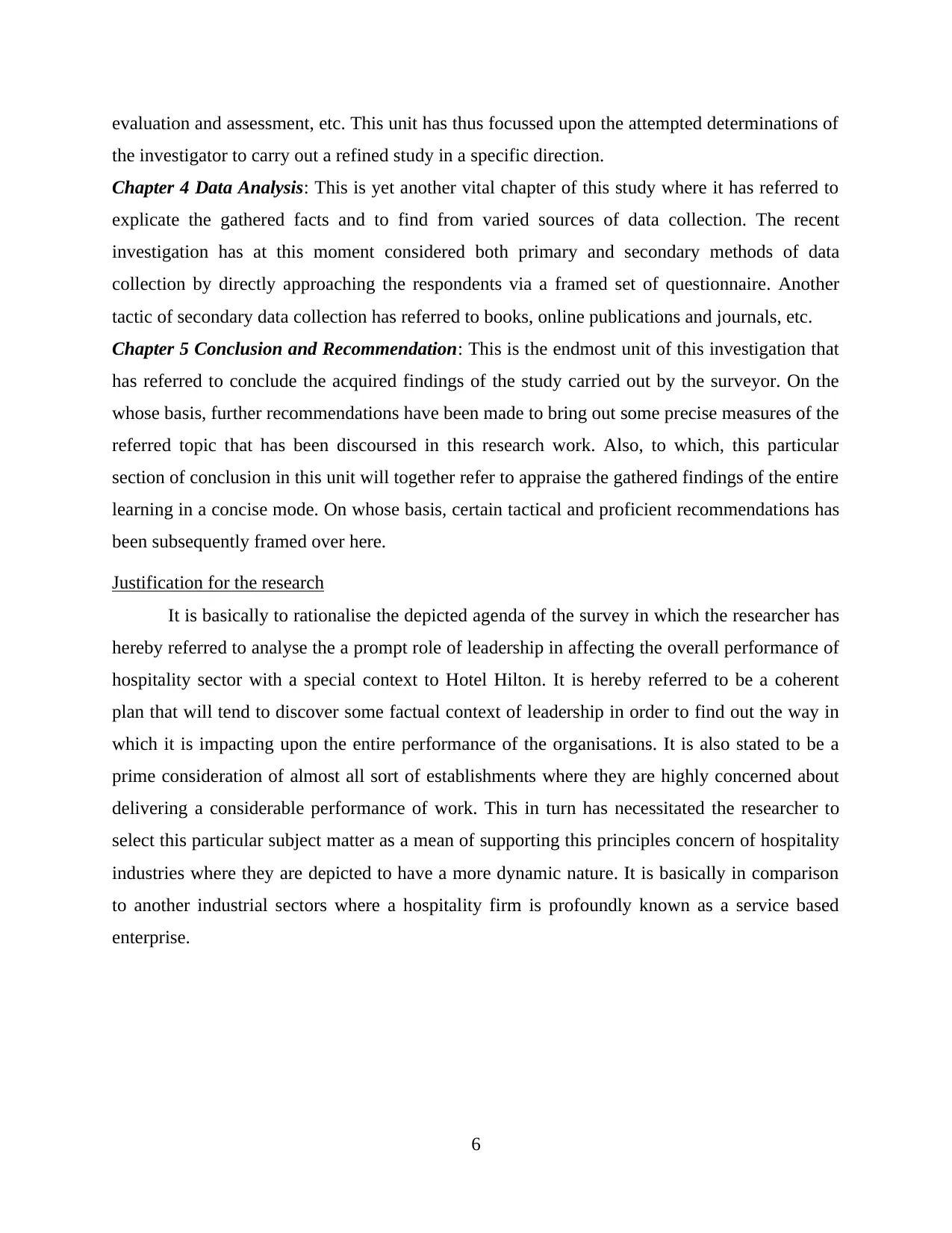
evaluation and assessment, etc. This unit has thus focussed upon the attempted determinations of
the investigator to carry out a refined study in a specific direction.
Chapter 4 Data Analysis: This is yet another vital chapter of this study where it has referred to
explicate the gathered facts and to find from varied sources of data collection. The recent
investigation has at this moment considered both primary and secondary methods of data
collection by directly approaching the respondents via a framed set of questionnaire. Another
tactic of secondary data collection has referred to books, online publications and journals, etc.
Chapter 5 Conclusion and Recommendation: This is the endmost unit of this investigation that
has referred to conclude the acquired findings of the study carried out by the surveyor. On the
whose basis, further recommendations have been made to bring out some precise measures of the
referred topic that has been discoursed in this research work. Also, to which, this particular
section of conclusion in this unit will together refer to appraise the gathered findings of the entire
learning in a concise mode. On whose basis, certain tactical and proficient recommendations has
been subsequently framed over here.
Justification for the research
It is basically to rationalise the depicted agenda of the survey in which the researcher has
hereby referred to analyse the a prompt role of leadership in affecting the overall performance of
hospitality sector with a special context to Hotel Hilton. It is hereby referred to be a coherent
plan that will tend to discover some factual context of leadership in order to find out the way in
which it is impacting upon the entire performance of the organisations. It is also stated to be a
prime consideration of almost all sort of establishments where they are highly concerned about
delivering a considerable performance of work. This in turn has necessitated the researcher to
select this particular subject matter as a mean of supporting this principles concern of hospitality
industries where they are depicted to have a more dynamic nature. It is basically in comparison
to another industrial sectors where a hospitality firm is profoundly known as a service based
enterprise.
6
the investigator to carry out a refined study in a specific direction.
Chapter 4 Data Analysis: This is yet another vital chapter of this study where it has referred to
explicate the gathered facts and to find from varied sources of data collection. The recent
investigation has at this moment considered both primary and secondary methods of data
collection by directly approaching the respondents via a framed set of questionnaire. Another
tactic of secondary data collection has referred to books, online publications and journals, etc.
Chapter 5 Conclusion and Recommendation: This is the endmost unit of this investigation that
has referred to conclude the acquired findings of the study carried out by the surveyor. On the
whose basis, further recommendations have been made to bring out some precise measures of the
referred topic that has been discoursed in this research work. Also, to which, this particular
section of conclusion in this unit will together refer to appraise the gathered findings of the entire
learning in a concise mode. On whose basis, certain tactical and proficient recommendations has
been subsequently framed over here.
Justification for the research
It is basically to rationalise the depicted agenda of the survey in which the researcher has
hereby referred to analyse the a prompt role of leadership in affecting the overall performance of
hospitality sector with a special context to Hotel Hilton. It is hereby referred to be a coherent
plan that will tend to discover some factual context of leadership in order to find out the way in
which it is impacting upon the entire performance of the organisations. It is also stated to be a
prime consideration of almost all sort of establishments where they are highly concerned about
delivering a considerable performance of work. This in turn has necessitated the researcher to
select this particular subject matter as a mean of supporting this principles concern of hospitality
industries where they are depicted to have a more dynamic nature. It is basically in comparison
to another industrial sectors where a hospitality firm is profoundly known as a service based
enterprise.
6
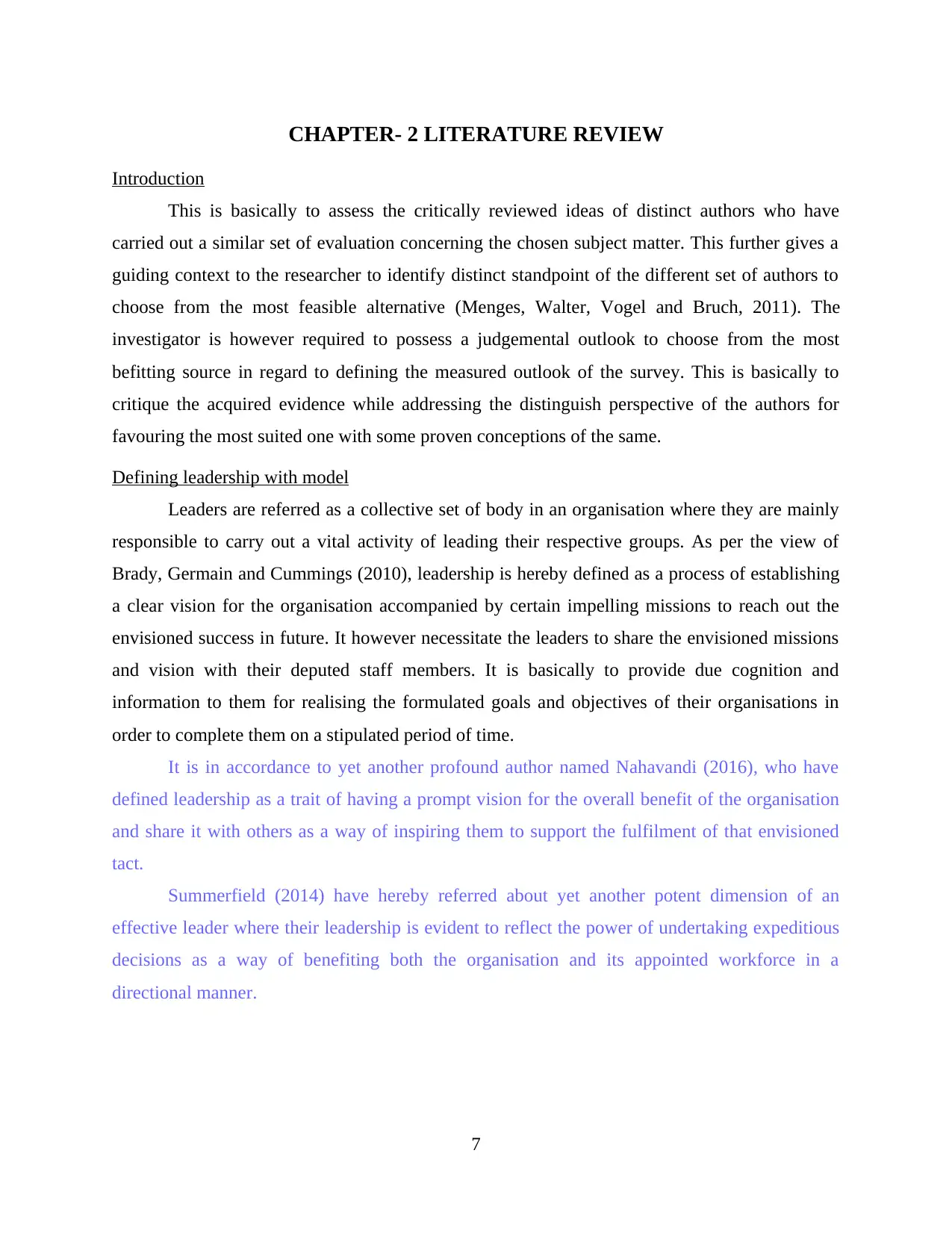
CHAPTER- 2 LITERATURE REVIEW
Introduction
This is basically to assess the critically reviewed ideas of distinct authors who have
carried out a similar set of evaluation concerning the chosen subject matter. This further gives a
guiding context to the researcher to identify distinct standpoint of the different set of authors to
choose from the most feasible alternative (Menges, Walter, Vogel and Bruch, 2011). The
investigator is however required to possess a judgemental outlook to choose from the most
befitting source in regard to defining the measured outlook of the survey. This is basically to
critique the acquired evidence while addressing the distinguish perspective of the authors for
favouring the most suited one with some proven conceptions of the same.
Defining leadership with model
Leaders are referred as a collective set of body in an organisation where they are mainly
responsible to carry out a vital activity of leading their respective groups. As per the view of
Brady, Germain and Cummings (2010), leadership is hereby defined as a process of establishing
a clear vision for the organisation accompanied by certain impelling missions to reach out the
envisioned success in future. It however necessitate the leaders to share the envisioned missions
and vision with their deputed staff members. It is basically to provide due cognition and
information to them for realising the formulated goals and objectives of their organisations in
order to complete them on a stipulated period of time.
It is in accordance to yet another profound author named Nahavandi (2016), who have
defined leadership as a trait of having a prompt vision for the overall benefit of the organisation
and share it with others as a way of inspiring them to support the fulfilment of that envisioned
tact.
Summerfield (2014) have hereby referred about yet another potent dimension of an
effective leader where their leadership is evident to reflect the power of undertaking expeditious
decisions as a way of benefiting both the organisation and its appointed workforce in a
directional manner.
7
Introduction
This is basically to assess the critically reviewed ideas of distinct authors who have
carried out a similar set of evaluation concerning the chosen subject matter. This further gives a
guiding context to the researcher to identify distinct standpoint of the different set of authors to
choose from the most feasible alternative (Menges, Walter, Vogel and Bruch, 2011). The
investigator is however required to possess a judgemental outlook to choose from the most
befitting source in regard to defining the measured outlook of the survey. This is basically to
critique the acquired evidence while addressing the distinguish perspective of the authors for
favouring the most suited one with some proven conceptions of the same.
Defining leadership with model
Leaders are referred as a collective set of body in an organisation where they are mainly
responsible to carry out a vital activity of leading their respective groups. As per the view of
Brady, Germain and Cummings (2010), leadership is hereby defined as a process of establishing
a clear vision for the organisation accompanied by certain impelling missions to reach out the
envisioned success in future. It however necessitate the leaders to share the envisioned missions
and vision with their deputed staff members. It is basically to provide due cognition and
information to them for realising the formulated goals and objectives of their organisations in
order to complete them on a stipulated period of time.
It is in accordance to yet another profound author named Nahavandi (2016), who have
defined leadership as a trait of having a prompt vision for the overall benefit of the organisation
and share it with others as a way of inspiring them to support the fulfilment of that envisioned
tact.
Summerfield (2014) have hereby referred about yet another potent dimension of an
effective leader where their leadership is evident to reflect the power of undertaking expeditious
decisions as a way of benefiting both the organisation and its appointed workforce in a
directional manner.
7
⊘ This is a preview!⊘
Do you want full access?
Subscribe today to unlock all pages.

Trusted by 1+ million students worldwide
1 out of 81
Related Documents
Your All-in-One AI-Powered Toolkit for Academic Success.
+13062052269
info@desklib.com
Available 24*7 on WhatsApp / Email
![[object Object]](/_next/static/media/star-bottom.7253800d.svg)
Unlock your academic potential
Copyright © 2020–2026 A2Z Services. All Rights Reserved. Developed and managed by ZUCOL.





